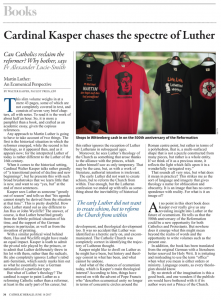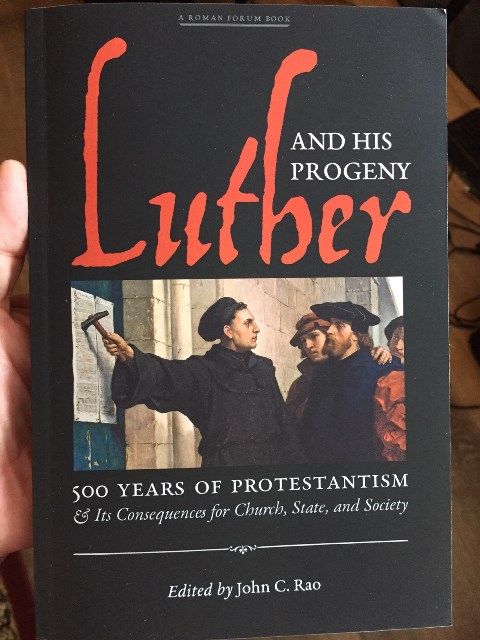 As you may know by now, the Catholic Herald is the UK’s best Catholic weekly. This week in the print and online digital edition there is a review of a new book – released in time for this year’s LutherFest!
As you may know by now, the Catholic Herald is the UK’s best Catholic weekly. This week in the print and online digital edition there is a review of a new book – released in time for this year’s LutherFest!
I can’t fathom why some Catholics want to celebrate the rending to shreds of Christendom, but… hey.
Mind you, I am not recommending the book I am about to mention, written by Card. Kasper. I recommend the review. I have another LutherFest book in mind for you, which I will mention at the bottom of the present. Now the review with my patented treatment:
Cardinal Kasper chases the spectre of Luther.
Can Catholics reclaim the reformer? Why bother asks Fr Alexander Lucie-Smith
Martin Luther
An Ecumenical Perspective
By Walter Kasper
Paulist PressThis slim volume weighs in at a mere 43 pages, some of which are not completely covered in text, and consists of seven very brief chapters, all with notes. To read it is the work of about half an hour. So, it is more a pamphlet than a book, and crafted as an academic essay, given the copious references.
Any approach to Martin Luther is going to have to take account of two things. The first is the historical situation in which the reformer emerged, while the second is his theology, as it appeared then, and as it appears now; for the interpreted Luther of today is rather different to the Luther of the 16th century.
When it comes to the historical setting, Cardinal Walter Kasper talks rather grandly of “a transitional period of decline and new beginnings”, but he presents this with such broad brushstrokes that we learn little that is new, and want to say “yes, but” at the end of most sentences. [As with most of the Cardinal’s writings, I think.]
Kasper sees Luther as someone “greatly out of season” and tells us that “his agenda cannot simply be derived from the situation at that time”. This is pretty doubtful. How does Luther stand out as any different to Jan Hus or John Wycliffe? The answer, of course, is that Luther benefited greatly from the febrile political situation of his time, and the support of the German princes in particular, as well as from the invention of printing.
With a similar political wind behind them, Hus and Wycliffe might have made an equal impact. Kasper is loath to admit the pivotal role played by the princes, or to admit that Luther deliberately threw in his lot with them, rather than the radicals. He also completely ignores Luther’s rabid anti-Semitism, which surely marks him out as what he essentially was: a German nationalist of a particular type.
[QUAERITUR…] But what of Luther’s theology? The cardinal is eager to paint Luther as a reforming Catholic rather than a reformer, at least in the early part of his career, but this rather ignores the reception of Luther by Lutherans in subsequent ages. [Indeed. Tell a committed Lutheran that Luther remained Catholic and really wanted people to remain Catholic but in a reformed Church.]
Moreover, he sees Luther’s theology of the Church as something that arose thanks to the alliance with the princes, which Luther himself saw as only temporary. That may be the case, but, as with a work of literature, authorial intention is irrelevant.
The early Luther did not want to create schism, but to reform the Church from within. True enough, but the Lutheran confession we ended up with tells us something about the inevitability of historical development, and theological development too. It was no accident that Luther was identified as a heretic early on, and excommunicated. [I always venerate the tomb of Leo X when I visit Rome.] The Catholic Church was completely correct in identifying the trajectory of Lutheran thought.
Kasper might like to dwell on Luther as he might have been, [!] but history and theology consist in what has been, and what cannot be undone.
And what of the chances of ecumenism today, which is Kasper’s main theological interest? According to him, things have moved on with the advent of Pope Francis who “describes ecumenical unity no longer in terms of concentric circles around the Roman centre point, but rather in terms of a polyhedron, that is, a multi-surfaced shape that is not a puzzle constructed from many pieces, but rather is a whole entity.
If we think of it as a precious stone, it reflects the light which falls upon it in a wonderfully variegated way.” [“wonderfully”… I demure.]
That sounds all very nice, but what does it mean in practice? This strikes me as the sort of language and imagery that gives theology a name for obfuscation and obscurity. It is an image that has no correspondence with reality. For what is it an image of?[NB] At no point in this short book does Kasper ever really give us any revealing insight into Luther or the future of ecumenism. He tells us that the 500th anniversary of the Reformation could be a new opportunity for both Catholics and Protestants. But nowhere does it emerge what this might mean beyond the realm of words and the opportunity to write volumes such as the present one.
In addition, the book has been translated from the original German with a literalness better reserved for Holy Writ. It is irritating and misleading to use the term “office” when what you mean is either orders or ministry. Language counts, as every theologian should know.
By no stretch of the imagination is this a good book, and one wonders if the publishers would have bothered with it if its author were not a Prince of the Church.
“By no stretch of the imagination is this a good book….”
Paulist Press could have been an additional hint. Right?
A very good book, on the other hand, is a set of essays on Luther, recently published by the increasingly esteemed Angelico Press.

To give you a sense of the thrust of the book, the Introduction is entitled: “Half a Millennium of Total Depravity (1517-2017): A Critique of Luther’s Impact in the Year of His ‘Catholic’ Apotheosis”. This is not an unqualified “RAH! RAH! FOR THE REFORMATION!”
I wish that I had 30 copies of this, to give to the seminarians and deacons of the diocese in August. Instead I chose Tracey Rowland’s terrific new book Catholic Theology.
The moderation queue is, of course, ON.



































It strikes me as very strange that the Vatican hierarchy should be interested at all about Protestants, let alone become obsessed with them. What is the fruit of Luther’s rebellion? An agglomeration of cults falling under the label of Protestantism, more and more of them as each decade passes until there are more flavours of Protestantism than flavours of gelato and sorbetto in a Roman gelateria. If the Vatican wants to accommodate all of them, where does it begin and end? They believe in so many different things, many of which conflict with one another.
In anticipation of all the lamentable excitement over the Luther anniversary, I’d also recommend the following: Gregory, Brad S. The Unintended Reformation: How a Religious Revolution Secularized Society. Cambridge, Mass.: Belknap Press of Harvard University Press, 2012.
Here is the First Things review: https://www.firstthings.com/blogs/firstthoughts/2012/03/the-unintended-reformation
US HERE – UK HERE
I’ve maintained that what Luther helped get rolling, along with the other Protestant Reformers, leads directly to the age of relativism, and the divorce from reality and nature, we’re dealing with now ( http://lexanteinternet.blogspot.com/2017/06/the-constantine-option-looking-at.html ). I can grasp why Cardinal Kasper and others might wish to contend that Martin Luther, who will be widely celebrated this year in Europe, was more with us than against us, but that doesn’t solve that problem much. A better approach might be to go to the various Lutheran groups that are out there and ask them to ponder if they represent what Luther meant, and perhaps ought to reconsider that, before they disappear.
Lutherns have atomic meltdowns when you mention the truth: Luther wanted to reform the Church, not start a ‘new’ one, especially one named after himself.
“I can’t fathom why some Catholics want to celebrate the rending to shreds of Christendom…”
The people you are referring to seemingly think hell is empty and that earth is merely a time to act like Backstreet Boys. Here I refer to a notorious MmmBop Bishop which shall remain nameless but thinks hell is empty and also writes in ways about Luther that make one question if he is referring to Luther theologically or Lavender Mafia-ically. Sadly enough, the MmmBop Bishop has fooled a large number into following him down the road to, well, a place that he thinks is empty.
Perhaps you could put the number of copies you want on your wish list and let your readers supply a copy or two of the Luther book for you to give to the seminarians?
Pingback: TVESDAY CATHOLICA EDITION | Big Pulpit
Here is a statement from Cdl. Walter Kasper:
“The God who sits enthroned over the world and history as a changeless being is an offense to man.” (Kasper, “God in History” 1967)
Kasper is not professing the Catholic faith. He is not professing Christian theology. The ideology in the statement above is post-Christian.
My sense is that Kasper believes that the God of the Gospel is not a real person – but just a human construct – and thus subject to manipulation – by Kasper and his current acolytes in the Church.
Well written and good comments. I would only add that Luther’s original writings were a mish mash of theological nonsense that appealed to the Northern German Princes simply to curry their favor by supporting their territorial claims against the Emperor. It was left to his adjutant, Melancthon, to put some sort of organization to Luther’s writings in order to form a somewhat coherent church. On his deathbed, Luther pleaded with his followers to not allow the destruction of his church. He had no intention of reforming the Catholic Church, which he regarded as too corrupt and deviating from true Christian teaching to be reformed.
Oh yes, by all means, let’s all “dialogue” with the Lutherans (and other, um, heretics).
But talk to the four Dubia cardinals or other “rigid” Catholics?
As they say on the streets of New York: “Fuhgeddaboudit.”